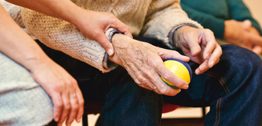Starting to think about how you can stay healthy in later life? Don’t worry we’re here to help!
As we get older, not only are we more susceptible to illness and injury, but you may find your mind starts to slow down too. Good nutrition and regular exercise can help against cardiovascular diseases and cognitive decline. Growing older you are more likely to suffer from dehydration; this happens as you don’t recognise you need to drink. This can heavily harm those with Alzheimer’s or if you’ve suffered from a stroke and so it is important to keep on top of drinking or including more watery based foods to reduce chances of dehydration.
You can begin to feel tired more often as you get older. Healthy fats are an important energy source and key to a healthy diet; so try to ensure you include plenty of them in your meals. Good sources include oily fish, avocados and peanut butter! Carbohydrates are also great energy sources. Wholegrain rice, pasta, cereal, lentils can all help with energy and fibre which is important for maintaining healthy bowel function and preventing constipation as we age.
When getting older your body can have trouble building and repairing muscle tissue. Meat, fish and dairy products (including milk, cheese, yoghurts) and eggs can help to increase the protein in your diet. For vegetarians and vegans; lentils, beans, tofu and tempeh are also good sources of protein.
Different vitamins and minerals help with different bodily processes, so it’s great to get a whole mix! B vitamins help with the brain and nervous systems. A lack of B vitamins can cause fatigue, a decline in your mental abilities, such as memory, understanding and judgement and loss of appetite.
So many websites can help you switch up your daily diet for something new and exciting! Just head over to the NHS Change 4 Life page or look into their Eat Better page!
Vitamin C and Zinc support the immune system and lack of these can harm your immune systems and leave you more susceptible to picking up infection. Mix up your day with shellfish to get some zinc into your diet; try out shrimp, oysters, crab and more! If shellfish isn’t the way for you, meat and dairy products also contain a good amount of zinc. Pumpkin seeds, cashew nuts and tofu are good options for vegans.
Oily fish is key to have in your diet as it contains omega 3 which helps to prevent against heart disease and maintain healthy brain function, it also contains some vitamin D. Vitamin D maintains healthy bones and muscle function as it aids in calcium absorption. Low levels of vitamin D can increase the risk of bone fractures, this is important as when we get older, we tend to be at higher risk of falls; 50% of people over the age of 80 suffer a fall each year!
Calcium is also really important for bone health, muscle function and normal blood clotting. Lack of calcium can lead towards different types of arthritis, one being osteoarthritis. With daily intake of milk, cheese and yoghurt you can help reduce the risk of getting arthritis!
How does exercise help?
Exercise helps in so many ways to keep you healthy and fit! It can increase life expectancy, reduce risk of various diseases such as heart disease, diabetes, dementia, strokes, depression and more! Even if you have arthritis, just 10 minutes of low impact exercise can help ease pain and joint stiffness.
Cheshire Change Hub runs a Falls Prevention programme which helps those who are at risk of a fall, improve both their strength and balance.
Please visit our website today to see if you’re eligible or call us 0300 777 0033.





